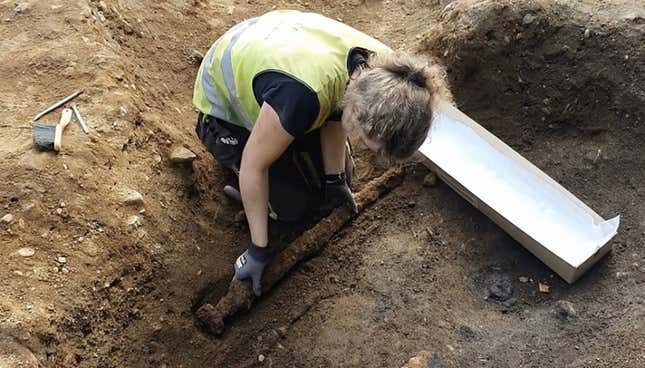
The unusual placement of a sword found in a Viking grave suggests the weapon was brandished by a southpaw warrior, in what is an unusual discovery.
“I’m a little surprised at how heavy it was,” Astrid Kviseth, an archaeologist at Norwegian University of Science and Technology (NTNU), told Science Norway. “I don’t exactly know how heavy a sword is, but it had some heft to it. You would have had to be pretty strong to be able to swing this sword!”
Kviseth, along with NTNU colleague Raymond Sauvage, have been excavating burial mounds and associated Viking graves near the Norwegian village of Vinjeøra. Work at the site is being done in preparation for the expansion of highway E39. The burial mounds and graves are located on a former Viking farm dating back to the 9th and 10th centuries CE.

The heavily corroded sword, an axe, a spear, and a shield were found in a ring ditch encircling a burial mound. Burial in this ditch was a great honor, as the person interred in the mound was likely someone of significance.
That a Viking warrior was found buried on a farm is not a surprise, as “most warriors were free men who owned their own farms,” Sauvage told Science Norway, a publication of NTNU. In fact, it was the law during the Middle Ages for farmers to procure weapons. Farmers first needed an axe and a shield, followed by a spear and a sword, he explained.
Normally, swords are placed on the right side of a Viking grave, which may sound strange given that right-handed people keep their sheaths on the left side of their bodies for easy access. A going theory is that the Viking afterlife, or underworld, is the “mirror image of the upper world,” Sauvage explained. The unusual placement of the sword suggests the warrior was left-handed, as this configuration best prepared him for the afterlife, according to the archaeologists.

The southpaw warrior’s grave intersected with the graves of three other warriors, which might sound undignified or haphazard, but it was a burial practice imbued with symbolism.
“We can imagine that this burial practice is an expression of how important the family’s ancestors were on a farm in Viking times,” explained Sauvage. “In addition to being present on the farm as companion spirits—fylgjur—the ancestors could continue to live physically in the burial mounds.”
To which he added: “This confirmed the family’s ownership of the land, and being buried close to an important ancestor or forefather (or -mother) was perhaps also a way to be included in the community of ancestral spirits.”
The NTNU archaeologists also uncovered a cremation grave that likely belonged to a woman, owing to grave goods such as an oval brooch, scissors, and beads. This grave was also a bit odd in that it contained 4.4 pounds (2 kg) of bone ash, which is consistent with an entire human body. In most Viking graves, archaeologists tend to find just half a pound (250 grams) of cremated remains. It’s not immediately obvious as to why the entirety of this person’s cremated remains were included in the burial.
The Viking sword is now at a conservation laboratory, where it will be analyzed using an X-ray machine. The researchers are hoping to see what might be hidden behind the rust, such as ornamentation or patterned welding.